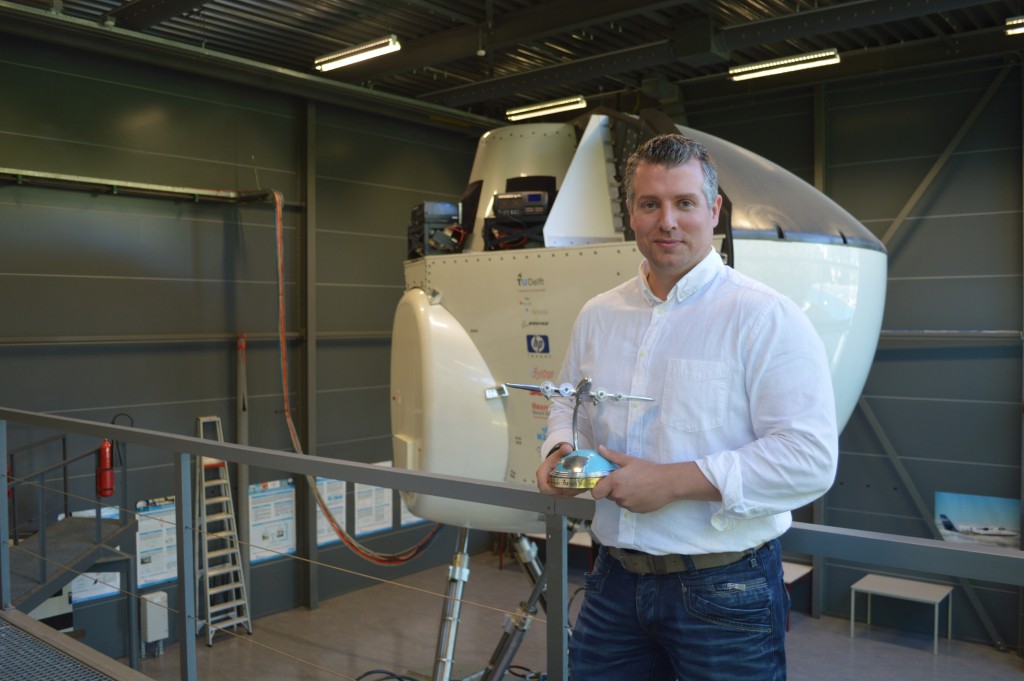People
Award: Teacher of the Year 2015-2016 for Clark Borst
This message was originally posted on the site of Ecological Design. Read the full details here.
Clark Borst: ‘Research and education need each other’
 During the opening ceremony of the academic year 2016-2017 in the Faculty of Aerospace Engineering, Clark Borst, lecturer and MSc track coordinator of Control and Operations, was voted AE Teacher of the Year by the students. So what sort of teacher is he? How does he combine his teaching duties with his research? And how does he envisage the future of education?
During the opening ceremony of the academic year 2016-2017 in the Faculty of Aerospace Engineering, Clark Borst, lecturer and MSc track coordinator of Control and Operations, was voted AE Teacher of the Year by the students. So what sort of teacher is he? How does he combine his teaching duties with his research? And how does he envisage the future of education?
‘Automation is a bit scary. It’s impersonal, emotionless. Automation can help us to progress, but it can also make us stupid. Take graphic calculators. Pupils don’t always learn how particular answers are calculated. They skip that step. I want to create automation that makes people smarter, not stupid. This is what drives me.
Learning to ask questions
Automation plays a major role in education. We have online education, and these days, students have fast access to all the information they need and are able to navigate their way skilfully through the digital world. But do they actually think about the information they receive? This is where our task as teachers lies. It is our job to help our students develop a critical attitude. It’s so important for their future, whether they choose a career in academia or leave university. A critical attitude will always stand you in good stead. One of the first things I try to teach students is that there’s no such thing as a stupid question. To me, the stupid thing is not to ask questions. This is the atmosphere I try to create in the lecture room: one of openness. And they’re allowed to laugh, too!’
Lectures becoming more valuable
‘Teachers can do great things with online education and media, although I have to say I’m not a great fan of Collegerama. I don’t understand why you’d want to record a lecture just to broadcast it online. Personally, I think that lectures, and the interaction they generate, are more important than ever in today’s digital, impersonal world. In a world where we are constantly bombarded with information, people are crying out for context and explanations. Students can learn books by heart, but does this mean they understand what they’ve read?
I think that the most valuable aspect of media in education is the huge range of images we can access: we can make theory visual, which helps to make things clearer. I always thought that the best teachers were the ones who managed to simplify highly complex concepts. So this was my own ambition when I started teaching. I enjoy looking for simplicity in complicated material. For the course in Avionics, for example, I make films with animations. It’s very time-consuming, but I enjoy doing it, and the films are really useful. I choose difficult subjects for these ‘tutorials’. Fortunately, the students seem to appreciate them, too.’
Boosting each other
‘Education is so important. This is a university after all! We are training the engineers of the future, and it is up to us to inspire a new generation. But education needs research to prevent it from losing touch. Your research can ‘feed’ your teaching with the latest relevant developments in the field. So it’s the combination that actually generates added value. Conversely, teaching can also boost your research. We mustn’t forget that we can learn from students by listening to the questions they ask. What do I do if I don’t have the answer to a question? I say that I don’t know, but I go away and start searching and come back with an answer at the next lecture. Difficult questions like this keep me on my toes, as a teacher and as a researcher.’

